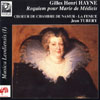Hayne Requiem for Marie de Médicis
A beautiful requiem for Mary, Dowager Queen of France, is very well served by Tubery and his musicians – and the [anthem] anthems round out the picture of Hayne
View record and artist detailsRecord and Artist Details
Composer or Director: Bernard Foccroulle, Gilles Henri Hayne
Label: Ricercar
Magazine Review Date: 3/2001
Media Format: CD or Download
Media Runtime: 51
Catalogue Number: 233382

Tracks:
| Composition | Artist Credit |
|---|---|
| Messe de Requiem pour Marie de Médicis |
Gilles Henri Hayne, Composer
(La) Fenice Bernard Foccroulle, Composer Gilles Henri Hayne, Composer Jean Tubéry, Conductor Namur Chamber Choir |
| (3) Antiennes Mariales |
Gilles Henri Hayne, Composer
(La) Fenice Bernard Foccroulle, Composer Gilles Henri Hayne, Composer Jean Tubéry, Conductor Namur Chamber Choir |
Author: Fabrice Fitch
This recording testifies to Ricercar’s continued commitment to the music of Belgium through the ages. Gilles Hayne was born in Liege in 1590 and spent his entire career there. The connection explains the composition of this Requiem Mass in 1643. Mary, Dowager Queen of France, had died in exile in Cologne in the previous year, and the French dignitaries arranged to meet the funeral cortege at Liege. Hayne, by then one of the city’s leading musicians, was commissioned to compose the appropriate Mass. Based on the accustomed plainchants, it is beautifully wrought, and well performed by La Fenice and the Chamber Choir of Namur. In his notes Jean Tubery rightly remarks on the tightrope negotiated by the composer, balancing the solemnity of the occasion with a sense of pomp commensurate with the rank of the deceased: the Offertory’s grandiose chordal declamation makes the point well. The instrumentation includes a serpent, whose appropriateness in such a context is attested by Mersenne in 1636.
The performers have the same tightrope to walk, and on the whole do so elegantly and with restraint: who is to say whether contemporary listeners would have found the dotted rhythms at ‘ne absorbeat’ in the Offertory too jaunty, or certain changes of tempo (in the Gradual from ‘non timebo’, and at ‘Hosanna’ in the Sanctus) lacking in reserve? This is not a choir of virtuosos, but in combination with the instrumentalists of La Fenice the singers’ clear voices do the music full justice. The instrumental interludes are welcome and equally well negotiated. The accompanying Marian motets (based on equally well-known plainchant antiphons) are perhaps not so impressive musically, but they give a taste of Hayne’s music in the round, and of music-making in his city. A byway of music history, perhaps, but in this performance one well worth treading.'
The performers have the same tightrope to walk, and on the whole do so elegantly and with restraint: who is to say whether contemporary listeners would have found the dotted rhythms at ‘ne absorbeat’ in the Offertory too jaunty, or certain changes of tempo (in the Gradual from ‘non timebo’, and at ‘Hosanna’ in the Sanctus) lacking in reserve? This is not a choir of virtuosos, but in combination with the instrumentalists of La Fenice the singers’ clear voices do the music full justice. The instrumental interludes are welcome and equally well negotiated. The accompanying Marian motets (based on equally well-known plainchant antiphons) are perhaps not so impressive musically, but they give a taste of Hayne’s music in the round, and of music-making in his city. A byway of music history, perhaps, but in this performance one well worth treading.'
Discover the world's largest classical music catalogue with Presto Music.

Gramophone Digital Club
- Digital Edition
- Digital Archive
- Reviews Database
- Full website access
From £8.75 / month
Subscribe
Gramophone Full Club
- Print Edition
- Digital Edition
- Digital Archive
- Reviews Database
- Full website access
From £11.00 / month
Subscribe
If you are a library, university or other organisation that would be interested in an institutional subscription to Gramophone please click here for further information.




